#Andreas malm
Text
In “Overshoot,” you write this about the very wealthy: “There is no escaping the conclusion that the worst mass killers in this rapidly warming world are the billionaires, merely by dint of their lifestyles.” That doesn’t feel like a bathetic overstatement when we live in a world of terrorist violence and Putin turning Ukraine into a charnel house? Why is that a useful way of framing the problem? Precisely for the reason I tried to outline previously, which is that spewing CO2 into the atmosphere at an excessive scale — and when it comes to luxury emissions, it is completely excessive — is an act that leads to the death of people.
We live in representative democracies where certain liberties are respected. We vote for the policies and the people we want to represent us. And if we don’t get the things we want, it doesn’t give us license to then say, “We’re now engaging in destructive behavior.” Right? Either we’re against political violence or not. We can’t say we’re for it when it’s something we care about and against it when it’s something we think is wrong. Of course we can. Why not?
That is moral hypocrisy. I disagree.
Why? The idea that if you object to your enemy’s use of a method, you therefore also have to reject your own use of this method would lead to absurd conclusions. The far right is very good at running electoral campaigns. Should we thereby conclude that we shouldn’t run electoral campaigns? This goes for political violence too, unless you’re a pacifist and you reject every form of political violence — that’s a reasonably coherent philosophical position. Slavery was a system of violence. The Haitian revolution was the violent overthrow of that system. It is never the case that you defeat an enemy by renouncing every kind of method that enemy is using.
3K notes
·
View notes
Text
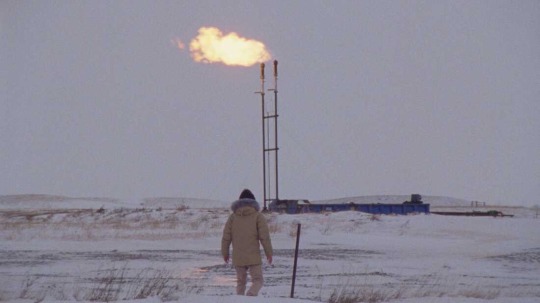
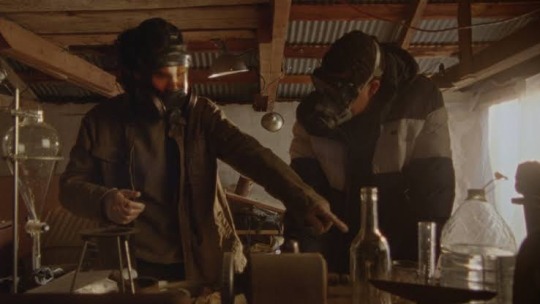
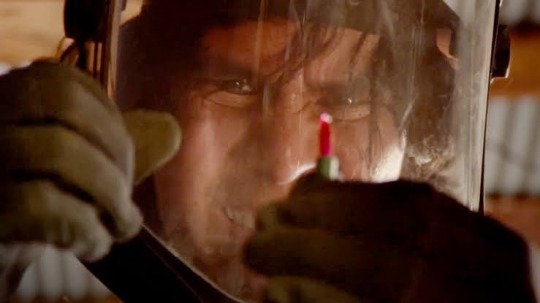
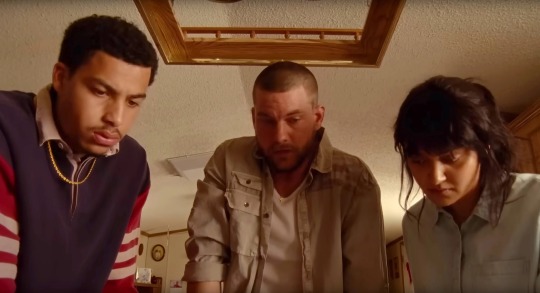
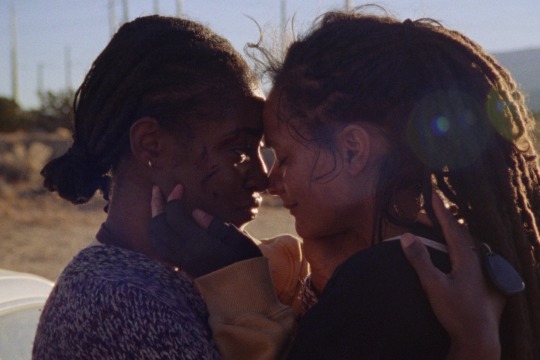

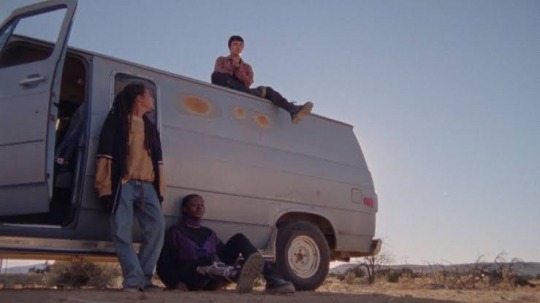
How to Blow Up a Pipeline (2022)
Dir. Daniel Goldhaber
262 notes
·
View notes
Text
About Blowing Up Pipelines
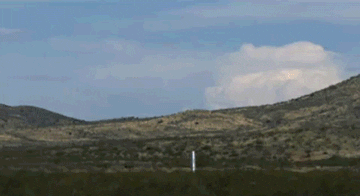
A while ago I saw a post about fossil fuels, under which someone posted: "What are you waiting for? Let's blow up the pipelines!" Which is very fair. But someone else came to post under it: "No! Think of the environmental harm! You need to go vote!"
And, let's be honest here: It is very likely that neither of them have actually read the book that the "blow up a pipeline" wording comes from. How to Blow up a Pipeline by Andreas Malm. Which in its core argues that sabotage is good, because voting doesn't do shit.
Now, don't get me wrong. There is a ton of important elections coming up - especially in the US, but soon in Germany as well. And you need to go vote to prevent another Trump presedency! However: There is nobody you can vote for, who will actually stop pipelines from being build, who will actually limit the size of cars folks drive, and who will actually put pressure on natural gas, coal and what not. Heck, even in the best case that on a local level there might be some who want to build out bike lanes and public transport... Those changes often take too long to bring them through during one term and if someone else is in charge next term, chances are, the projects will be cancelled.
So, basically what Malm argues in his book: Voting will not change those things, partly because of lobbyism. Protests will be ignored, partly because politicians care more about the lobbyists. Same goes with petitions. So, the usual ways that technically a democracy will leave for people to engage and influence politics do not work.
But, so Malm says, sabotage does.
Now, he does actually not directly argue for literally blowing up pipelines. But he is arguing for sabotage. He notes: "If just a few people with their keys run through a city during the night and scratch up all the SUVs, a lot fewer people will on the long term use SUVs." He even talks about something like this that he participated in in Sweden and what effects it had.
And yes, he does give ideas of how to deal with pipelines in ways that will do a lot of financial damage, which makes pipelines and hence fossil fuels a lot less attractive to energy providers. Because they are going to need to pay for all that damage.
Even with smaller sabotage... yes, there will be some environmental damage. But try to think of it this way: If enough folks do this, if there is enough damage done on the pipelines (and other forms of creating and transporting fossil fuels), then less of them will be build, will be used. And given that those pipelines and other fossil fuels will leak into the environment either way, and over time will do a lot more damage than a few cases of sabotage will do.
And I really gotta say: Yeah, no, I do agree with Malm. On all the fronts.
So, please... The book is actually super short. Just go an read it, alright?
#environmentalism#environment#pollution#fossil fuels#climate crisis#going green#how to blow up a pipeline#andreas malm#solarpunk#lunarpunk#anarchism
39 notes
·
View notes
Text
Folks…I just watched How To Blow Up A Pipeline and whew, I have THOUGHTS and EMOTIONS. Please if you can watch this film (it’s on Netflix, Hulu and Sky!)

#how to blow up a pipeline#daniel goldhaber#Andreas malm#climate activism#civil disobedience#industrial sabotage#solarpunk#hopepunk#community organising#environmentalism#puts the punk in solarpunk imo
113 notes
·
View notes
Text
im reading fossil capital: the rise of steam power and the roots of global warming at the moment, and its absolutely fascinating - i think most of us probably assumed that steam power overtook water power because it was just. better. like using an electric drill over a hand drill or something. but it's actually SO much more complicated than that, because coal was very expensive and water was free, and the reasons steam ended up being the main thing are to do with population/available workers (you can pick the location of steam engines, you can't move rivers), control of the power source (mill owners not being willing to accommodate other mills downstream or tolerate inconvenience caused by upstream), workers winning a 10 hour work day (the river flows arent consistent, and if you can't make your workers stay late then you miss out compared to steam), and so many more complicated social and economic factors??? the author also traces the way people talked about the environment impacts of heavy coal consumption (charles babbage!!! wtf!!) and it's just SO intensely interesting omg
#fossil capital#andreas malm#i think most people know him from how to blow up a pipeline#but i havent read that one yet but im super excited because of how well researched and thorough but accessible this one is
10 notes
·
View notes
Text
“Sometimes I think that the meaning of life is to not give up, to keep the resistance going even though the forces stacked against you are overwhelmingly strong.”
— Andreas Malm via “How This Climate Activist Justifies Political Violence”
4 notes
·
View notes
Text
Andreas Malm on private jets and the difference between luxury and subsistence emissions in How to Blow Up a Pipeline:






#andreas malm#how to blow up a pipeline#luxury emissions#subsistence emissions#private jets#currently reading
119 notes
·
View notes
Text
Standing with the Palestinian resistance: A response to Matan Kaminer by Andreas Malm in Verso
"If people identify as Marxists, what ought they to do if they were in Gaza? They ought to join Marxists fighting on the ground there. And if they are unable to enter the besieged and destroyed and occupied and burning ghetto? Then they should stand in solidarity with their comrades inside. These are not entirely hypothetical matters. It so happens that there are Marxists fighting on the ground, namely the Popular Front for the Liberation of Palestine (PFLP) and the Democratic Front for the Liberation of Palestine (DFLP): from the earliest morning hours of Toufan al-Aqsa to the battles raging yesterday, they have participated in the guerilla war against the genocidal occupation...
"Precisely the dismal status of the left across the globe should make us value this one all the more. Here we have it, an actual organised left, present on the frontlines of the central battle against empire in this historical moment...
"...[O]ne can – staying with the method of historical analogism – consider the first car bomb planted by the uMkhonto we Sizwe in 1983, aimed at an air force and military intelligence office in the heart of Pretoria, in which nineteen people were killed – civilians included. After this bomb, the armed wing of the ANC entered a phase of escalated struggle against the apartheid regime, causing a string of civilian deaths. What should we think of this?...
"...I also don’t particularly enjoy reading about the killing of civilians at the hands of the FLN, the Mau Mau rebellion, the Nat Turner revolt, the Haitian revolution or the Sepoy mutiny or the Tupac Amaru uprising, to mention just a few cases – several of which indulged in gruesome mass violence against the civilian population of colonisers to an extent far, far beyond anything Palestinians have ever done. And yet we, on the Left, commemorate the Haitian revolution as the greatest single act of emancipation in the New World, perhaps even in the modern era. Should we, after October 7, rather start condemning it, on the principle that civilians must never be killed? Or should we remember the violence against the white civilians as an ugly aspect of a legitimate struggle for freedom, the victory of which marked an unusually genuine instance of progress in history?
"When we speak of resistance against murderous oppression and the fight for survival and freedom, do we only bother about the past? Are we happy with it when it is so comfortably distant as to be amenable to kitsch? We have the Black Panthers in photo books and Malcolm X on our walls – then why not also the PFLP and Abu Obeida? Is revolutionary politics a posturing about the past, or about real struggles that happen as we speak? On what grounds do we admire the heroes from millennia of subaltern endeavours at self-emancipation, but not the Palestinian fighters who run all the way up to the tanks and deliver their bombs with their hands and dash off? Why should they not be in our pantheon? I see two possible reasons: we are actually not that serious about the commitment, or we do not consider Palestinian lives worthy enough to be fought for. This fight may well end in the defeat of a total destruction of Gaza and its people, and more beyond. Until then – so the streets of New York tell me – there will be quite a few of us who stay with the vow and stand with the resistance."
1 note
·
View note
Note
Any thoughts or resources on the absence of ecoterrorism in this day and age? Anarcblr said you might have thoughts.
https://anarcblr.tumblr.com/post/692319868481159168/not-sending-this-for-a-reblog-just-something
It's an interesting question, isn't it? Why, given what we know about the state of the biosphere and the existential threat to humanity, and given widespread knowledge about the roots of the crisis, do we not see more direct attacks on that system and its infrastructure?
I think that part of the answer certainly lies in the Green Scare and worldwide crackdown on eco-anarchists and other millitants (espescially, in a north american context, indigenous millitants), which really ended a generation of millitant activity. This really strengthened the dogmatic belief in non-violence within enviromentalist circles. Additionally there is the fact that the political origins of these spaces does have a very broad political framwork, inclduign eco-socialists and -anarchists, but also conservatives, a few semi-fascists (such as the Dark Mountain group here in the UK), various Christians, New Age-ists (both of whom are almost exclusively theologically committed to absolutist non-violence, though some of the Christians commit brave acts of sabotage and face lengthy prison sentences) and, mostly and most prominently, NGOs. The presence of unruly and millitant voices and actions is a threat to their income stream, and therefore the "movement" as it is has a standing interest in policing itself, even while outwardly extremely radical, even apocalyptic.
This is certainly part of the answer. Another part, I think, is just in the fact of the time that we live in - call it the "spirit of the age", the "time of monsters", "the end of history", the total victory of neoliberal 'there is no alternative' or whatever. I think that this period is primarily defined by the political expectation - not just acceptance, but expectation - to hold contradictory ideas and notions at the same time. None of us are innocent of this. One of the most common ones of these is the ability to keep acting as though the earth isn't spiraling rapidly towards mass death on an unprecedented scale, even though we all know that this is true.
Idk if that's at all an answer, but those are the main two answers that I've been able to come up with when I've considered this question before - how to break them is a whole other question. Hope that helps some?
#also sorry for taking like two days to answer this I've been busy#ANdreas Malm#who I disagree with a lot#but has some interesting things to say#also grapples with this question in How to blow up a pipeline? which you might find interesting
32 notes
·
View notes
Text
A ruling order that destroys the foundations of life deserves no loyalty from its subjects.
Andreas Malm, How to Blow Up a Pipeline
143 notes
·
View notes
Photo
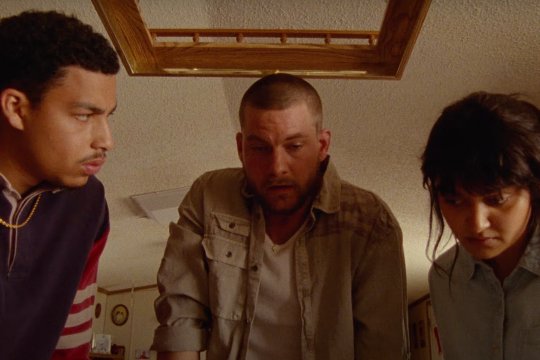
How to Blow Up A Pipleline (dir. Daniel Goldhaber) x TIFF 2022.
[It] adapts Swedish academic Andreas Malm’s non-fiction climate activist book about ecological sabotage into a gripping contemporary heist thriller. Set in the vast oil fields of West Texas, the film’s radical message of driving active change through destruction and property damage frames an intriguing narrative hook of justifiable eco-terrorism for the greater good to save humanity from ourselves.
#how to blow up a pipeline#pipeline#daniel goldhaber#neon#tiff#tiff 2022#ariela barer#movie#movies#movie review#film#film review#indie film#indie movie#cinema#andreas malm#kristine froseth#lukas gage#forrest goodluck#sasha lane#jayme lawson#marcus scribner#jake weary#irene bedard
4 notes
·
View notes
Text

Is there still time to save the planet? Eco-thriller How To Blow Up A Pipeline is showing from tomorrow.
#How To Blow Up A Pipeline#Daniel Goldhaber#Ariela Barer#Jordan Sjol#Andreas Malm#Climate Crisis#Eco Thriller#Regent Street Cinema#London#Cinema#Regent Street#Oxford Circus#Independent Cinema
4 notes
·
View notes
Text
How to Blow Up a Pipeline

Movies watched in 2023
How to Blow Up a Pipeline (2022, USA)
Director: Daniel Goldhaber
Writers: Ariela Barer, Jordan Sjol & Daniel Goldhaber
Mini-review:
I was a huge fan of Daniel Goldhaber's first film, the arrestingly original and unsettling Cam, so I was really looking forward to his next work. And How to Blow Up a Pipeline didn't disappoint at all. In fact, it's an even better movie in pretty much every way. It brings incredibly important issues to the forefront, and does so with impressive levels of tension. The movie gets more and more intense as it goes on, and by the end it had me on the edge of my seat. In fact, I audibly gasped during several scenes, that's how immersed I got.
The movie is not very long, but it makes sure to spend just enough time with the characters, in order to learn about their backgrounds and reasons. The flashbacks are inserted in the perfect moments, building tension and helping the viewer get to know the characters at the same time. I also loved how all the characters were morally grey antiheroes. You can't help but side with them and hope they pull it off, even if you know they're planning on comitting a major crime that won't only affect their targets. This is all thanks to the strenghts of the writing and the cast. To sum up, this movie is an intense eco-thriller that delivers nail-biting suspense and shines a light on very important themes and issues.
#how to blow up a pipeline#daniel goldhaber#ariela barer#jordan sjol#kristine froseth#lukas gage#forrest goodluck#sasha lane#jayme lawson#marcus scribner#jake weary#irene bedard#andreas malm#thriller#eco terrorism#environmetalists#lesbian#wlw movie#lgbt+#lgbt#anti hero#lgbtq#lgbtqia#movies watched in 2023
5 notes
·
View notes
Text

Babe Ruth warning: avoid Andreas Malm ! makes offers he does not follow up on

0 notes
Text
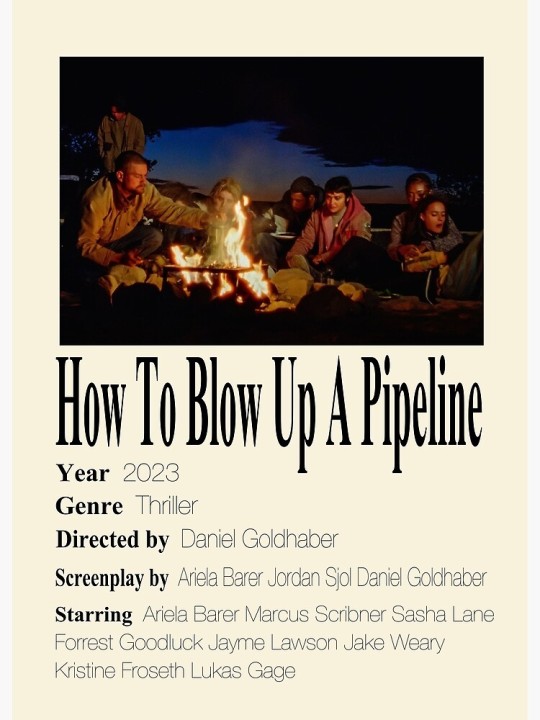
Movie #9 of 2024: How To Blow Up A Pipeline
I don't understand why there was a lot of controversy around this movie. It made it sound like it was some kind of weird liberal propaganda, but nothing could be further from the truth.
This is great FILMMAKING and storytelling that ratchets up the tension to pipeline exploding levels. The world building is top notch. It's our world.
Cinematography? Crackerjack natural lighting and fill ratios to please the most annoying coked out director of photography.
Young actors that seem more worldly and able to bring gravitas that professionals 20 years their senior couldn't muster if their lives depended on it.
The editing propels the story forward as the band of rebels moves forward with their illegal plan. Peppered with parallel action detailing how the group got motivated and came together ratcheting up the tension as you realize you're not sure who is the mastermind behind this expedition and who is actually playing who.
Worthy cinema that should be shown in theaters all the time on Sundays at matinees.
#how to blow up a pipeline#daniel goldhaber#ariela barer#jordan sjol#andreas malm#rhiannon mcgavin#gavin brivik#tehillah de castro#daniel garber#english#16mm#compelling#great#2023#09#action#crime#drama
1 note
·
View note
Text
New York Times Advocates To Blow Up Pipe Lines
The New York Times says: “the idea of attacking infrastructure and closing down new pipelines is a disarmament. It’s about taking down a machine that actually kills people.“. I protested: This is as wrong as it gets. Shutting down the fossil fuel economy would kill billions of people. NYT censored my common sense. After declaring that men who want to be viewed as women just have to say so, or…

View On WordPress
0 notes